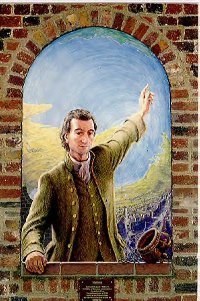See Dissecting Deism Past and Present
English Deists - John Toland
Deducing the full consequences of Locke's theory, John Toland (d. 1722), in his Christianity not Mysterious (1696), maintained that the content of revelation must neither contradict nor transcend the dictates of reason. Revelation is not the basis of truth, but only a " means of information " by which man may arrive at knowledge, the sanction for which must be found in reason.
Primitive Christianity knew nothing of mystery, whose sources are Judaic and Greek, and the original Christian use of the word mysterium conveyed no idea of that which transcended reason. The basis is thus laid for the critical study of early Christianity.
Further problems of Biblical criticism and the distinction between the diverse parties in primitive Christianity are advanced in Toland's Amyntor (1699) and Nazarenus ; or Jewish, Gentile and illahometan Christianity (1718). In like manner, Anthony Collins (d. 1729), in his Discourse of Freethinking (1713), developed the consequences of Locke's propositions.
Revelation depends for its sanction upon its agreement with reason, and what is contrary to reason is not revelation. Practical morality is independent of dogma, which, on the contrary, has been the cause of much evil in the history of the world. Christ and the Apostles, the prototypes of the freethinkers, never made use of supernatural authority, but confined themselves to simple, rational demonstration. Collins's work elicited numerous replies; but none really made answer to his main thesis. After remaining silent for eleven years, Collins renewed the contest with a contribution on prophecy and miracles. Setting out from Locke's proposition that revelation was truth sanctioned by reason, he found it a simple step to reject prophecy and miracles as non-essential characteristics of religion, amounting at most to mere didactic devices.
The mathematician William Whiston (d. 1752) gave a new impulse to the controversy by the publication of The True Text (1722), in which the lack of real concordance between the New Testament interpretation of Old Testament prophecies is pointed out, and the prevailing allegorical method of reconciling such differences summarily rejected.
The present form of the Old Testament is characterized as a forgery perpetrated by the Jews, and an attempt is made by Whiston to restore the original text. Collins, in his Discourse on the Grounds and Reasons of the Christian Religion (1724), agreed with Whiston as to the discrepancies between the two Testaments, but defended the allegorical method of interpretation. Thomas Woolston (d. 1733) came to the support of Collins in this controversy over the Biblical prophecies; and when his opponents shifted their appeal from the prophecies to the miraculous acts of Jesus he applied his destructive allegorical method to those also, in his Discourses on the Miracles of our Saviour (1727-30).
- Islam Versus Deism
- Left vs Right, Montesquieu, Corporatism
- Eastern Roman Empire and Islam
- Philosophies of Islam, Greece, and the West by Turgut Ozal
- Example of Islam and science.
- Maimonides Versus Aristotle and the Jews of Spain, Thirteen Rules
- Handbook on the History of Modern Science
- Pelagius and why he was right
- Islam Versus Judaism and Christianity
- Islam to Deism: Why I became a Deist
Web site Copyright Lewis Loflin, All rights reserved.
If using this material on another site, please provide a link back to my site.

